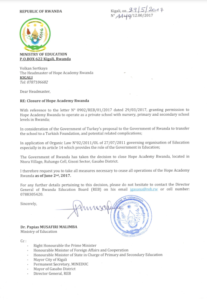Ayşe Şule
The Turkish government has been pursuing its opponents around the world since a coup attempt in 2016, mainly alleged members of the Gülen movement, a faith-based group outlawed by Ankara.
The Gülen movement is inspired by Turkish President Recep Tayyip Erdoğan’s arch-foe Fethullah Gülen, a Turkish cleric who has lived in self-imposed exile in the US since 1999. The group declares its aim as promoting charitable work throughout the world, with an emphasis on education and dialogue.
At its peak the Gülen movement operated schools in 160 countries and ran thousands of educational facilities in Turkey, including grade schools, prep schools, universities and dormitories. The movement is well known for its educational activities and civic initiatives worldwide.
The Turkish government has been targeting the Gülen movement as well as others in the country who oppose it, including journalists, dissidents and members of the Kurdish political movement.
The government accuses the Gülen movement of orchestrating a failed coup in 2016, arresting tens of thousands of people and dismissing some 130,000 civil servants from their jobs.
Designated as a terrorist organization by Ankara, the Gülen movement denies involvement in the coup or any terrorist activity.
Abdülkadir Sema, who spoke to Turkish Minute using a fictitious name due to security concerns, is one of the people who were impacted by Turkey’s transnational repression, which refers to attempts by governments to intimidate, harass, silence and persecute foreign-based citizens.
Since the 2016 coup attempt, President Erdoğan’s long arm has reached tens of thousands of Turkish citizens abroad.
Erdoğan repeatedly vowed that his government would ensure that Gülen movement members would find no safe haven wherever they go, boasting of the efforts by the country’s intelligence agency to return alleged Gülenists to Turkey.
Nihat Zeybekçi, Turkey’s economy minister at the time of the coup, said the ruling Justice and Development Party (AKP) government would punish plotters of the abortive putsch so severely that they would beg for death.
From spying through diplomatic missions and pro-government diaspora organizations to the denial of consular services and outright intimidation and illegal renditions, the Turkish government has been using a wide range of tactics against its critics overseas.
A businessman and entrepreneur, Sema and his wife moved to Rwanda in 2015 after a friend who wanted to start a business in the country reached out to him.
Sema agreed to start a new company in Rwanda that promoted and sold Turkish products, such as construction materials.
He and his wife were still able to visit Turkey until the coup attempt in 2016.
The Hope Academy, established in 2013 in Rwanda by Gülen movement supporters, was under construction when Sema first arrived in the country.

“They were building a very excellent school of high quality and on a very excellent hill,” Sema says, explaining that “Rwanda” means the country of a thousand hills.
Turkish entrepreneurs founded the school after Rwandan President Paul Kagame visited Turkey in March 2011 and met with a number of Turkish businesspeople, inviting them to come and invest in his country, according to The New Times.
The school’s then-head teacher explained that the school’s mission was to raise children who were “globally minded and locally based.”
Erasme Rwanamiza, the director general of education planning at the Rwandan Ministry of Education, commended the Turkish school for promoting education at the time, saying, “The government supports the growth of private schools, and we encourage more and more international schools to open in Rwanda,” according to The New Times report.
Students of Hope Academy #Rwanda pray for #Brussels. #PrayForBrussels
@HopeAcademyRwa @iflcbrussels pic.twitter.com/ydI4gpJoWI— IFLC (@intFLC) March 24, 2016
“Our business was going well, it grew and developed into a company that employed a hundred people. Then other Turks came and established companies, and they also did very well,” Sema says, adding that “Rwanda is a small country, but it was engaged in a significant amount of trade with its neighbors.”
In the meantime the school, which didn’t have many students in the first few years, according to Sema, had since then attracted a respectable enrollment.
The school’s growth, however, was interrupted after news broke that the Maarif Foundation had asked the Rwandan government for the school.
The Turkish Maarif Foundation (TMV) is a government-run education body that was established by the Turkish parliament before the coup attempt in July 2016.
The government’s aim was to shut down educational institutions connected to the Gülen movement. The TMV was to take over these institutions when possible, in the event countries did not want to close top-quality educational facilities operating on their territory.
According to Sema, who had heard of the TMV’s interest in the school, the Rwandan government refused to give in to their demands to take it over, but the school’s certificate of education, necessary to legally operate in Rwanda, was revoked due to pressure from Turkey.
Sema says it’s believed that Turkey offered the Rwandan government financial assistance and training for police and the military in return for the school.
According to Sema, Rwanda’s minister of defense would go to Turkey every year and receive briefings, which would always end up being very one sided, adding that “there is no one who can defend the other side, they believe whatever the state tells them.”
Rwanda and Turkey signed security agreements in 2015, according to an article on the Rwanda National Police website, which mentions that “Rwanda’s [then-Inspector General of Police Emmanuel Gasana] and his counterpart of Turkish Police signed a memorandum of understanding to cooperate in areas of training, focusing on counter terrorism, cybercrimes, special forces training and Training of Trainers (ToT) courses, among others.”

After Rwanda gave in to Turkey’s pressure and the school’s education certificate was revoked, its 200 students were transferred to other schools.
The school was able to keep the property, which ended up being sold to a Belgian school in Rwanda.
11. Look what Daily Sabah says… "Turkey's desires"
so sweet and lovely… pic.twitter.com/irDyJt22Nv— Isa Gokturk Yilmaz (@IGokturkYilmaz) August 1, 2017
Sema says the teachers departed within a week since they weren’t allowed to stay in the country.
The teachers had to leave in such a hurry that “some of them still had dough in the fridge to bake cakes or to make borek, so the dough was just sitting there,” says Sema.
In the meantime, they were relieved to be told that no legal action would be taken against entrepreneurs and businessmen in Rwanda who had come from Turkey.
However, after a while, a few Turkish businessmen were arrested, according to Sema, following a letter from Ankara alleging that the businessmen had entered Rwanda illegally.
Although they were able to prove they had entered the country legally with their passports, their travel documents were “considered less proof than a government letter,” according to Sema.
The Turks in the country sought help from an individual with connections to the Rwandan president, who suggested involving INTERPOL.
“Interpol says don’t pay attention to anything coming from Turkey. Turkey is lying because Turkey considers a lot of people, innocent people, to be terrorists,” Sema says, but adds that the Rwandan government ultimately advised the businessmen to leave Rwanda as soon as possible so as to allow it to maintain diplomatic relations with Ankara since it did not want to lose Turkey’s support.
The businessmen were already being prosecuted in Turkey, where their assets were also confiscated.
“One of them passed away from a brain tumor two years later,” Sema says, adding that they thought this wouldn’t happen to everyone in Rwanda since the people who were arrested by the authorities had court cases filed against them back in Turkey over alleged Gülen movement membership.
However, a year later, when Rwanda’s defense minister returned from Turkey after a briefing by the Turkish government, a few more Turkish businessmen in Rwanda faced arrest by the authorities.
“But they told [those people facing arrest] to get out of Rwanda as soon as possible. ‘We know you aren’t terrorists, but we have to do this’,” Sema says they told the businessmen.
Sema says intelligence officers followed those Turks, who were friends of his, to make sure they were packing up at home and that he brought tea to one of the officers waiting outside in a car.
In 2019 Sema left Rwanda with his wife after an opportunity to move abroad appeared.
He managed to depart for the United States and settled there with his family. As for his experience in Rwanda, Sema thinks that the government there did try to look out for them without damaging its relationship with Turkey.
“They knew us, I mean they knew our good intentions and everything, and we knew that they had good intentions. They are very good people, the Rwandans, very respectful people,” he says.
Freedom House’s 2021 report on Turkey highlights the country’s transnational repression campaign, which the report states is “remarkable for its intensity, its geographic reach, and the suddenness with which it escalated.”
The report cites the 2016 coup as a major turning point, after which “Ankara initiated a ‘global purge’ that mirrored its domestic crackdown.”
